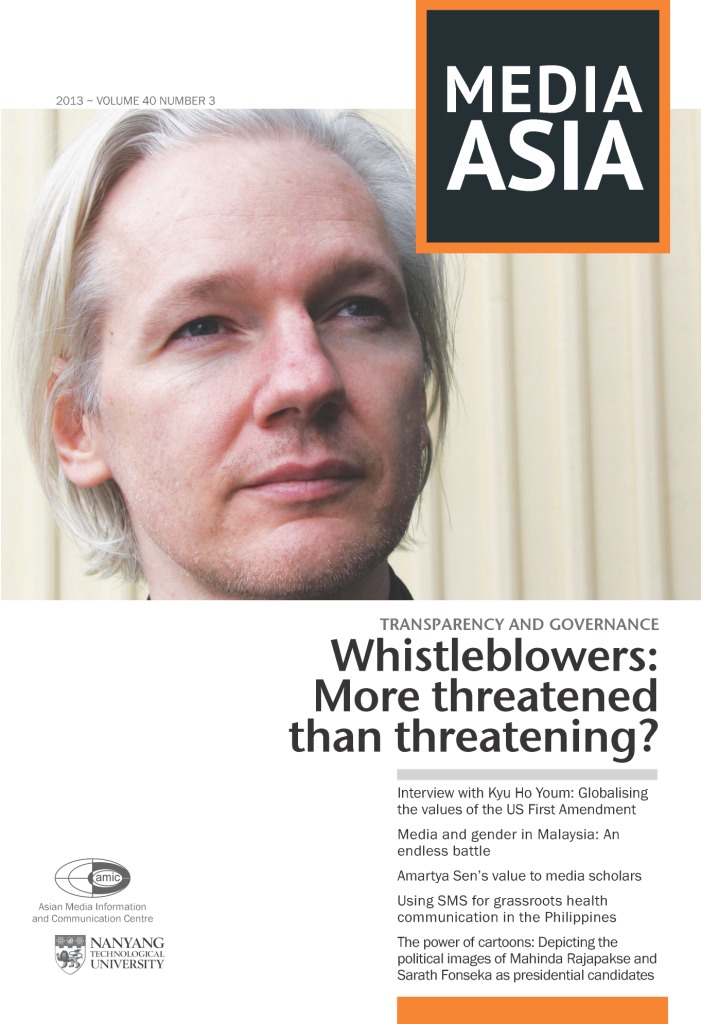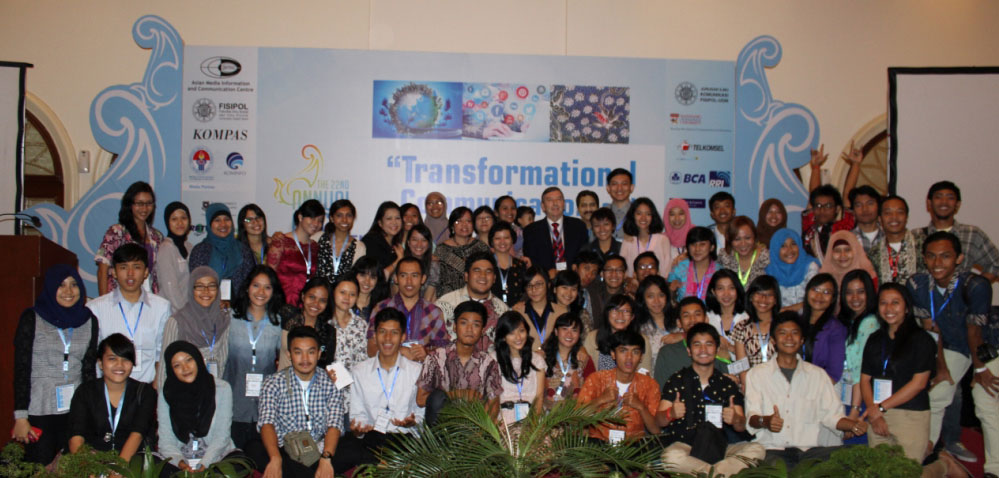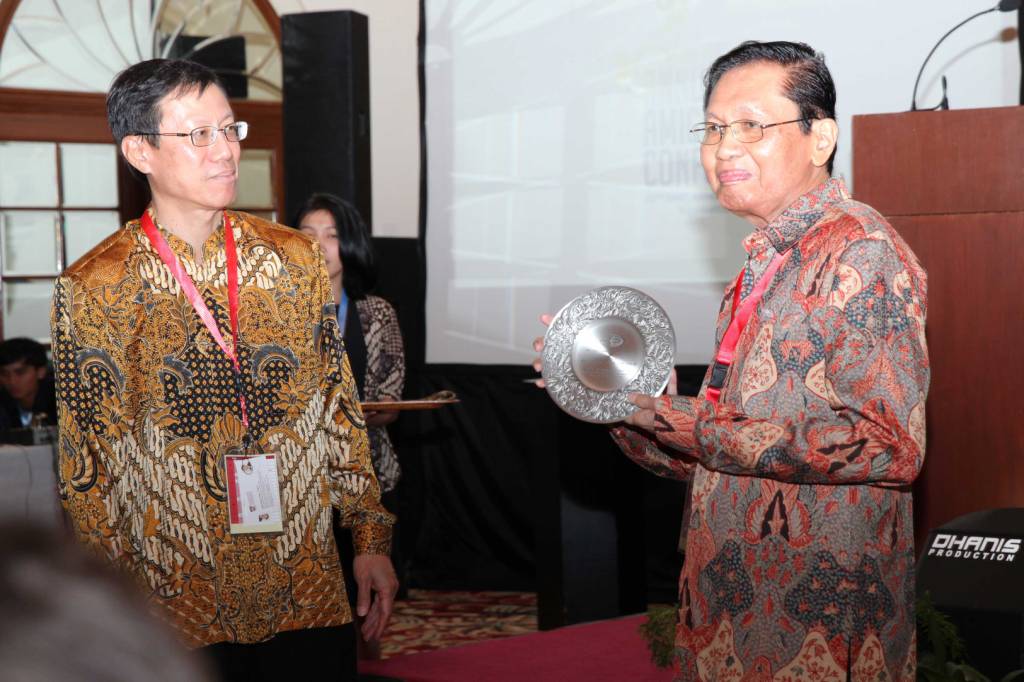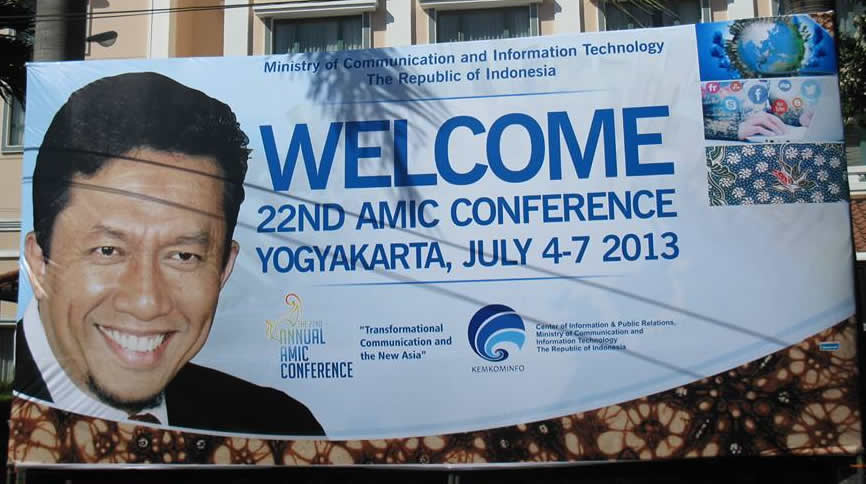
Sep 25, 2013 | News
 Should whistleblowers, such as the American intelligence analyst Edward Snowden and US Army Private Bradley Manning, be treated as heroes or traitors?
Should whistleblowers, such as the American intelligence analyst Edward Snowden and US Army Private Bradley Manning, be treated as heroes or traitors?
The debate on Government secrecy and the public’s ‘right to know’ is given an airing in the latest edition of AMIC’s quality, quarterly journal, Media Asia. In an article on recent global controversies which have placed the spotlight on the power of individuals to expose high-level corruption and other activities, Suruchi Mazumdar examines the rationale for protecting whistleblowers and also questions Asia’s ‘patchy record’ in this field.
Also in Media Asia Volume 40, No. 3, Editor-in-Chief, Professor Cherian George, interviews Asian-American scholar Dr. Kyu Ho Youm on the influence of America’s First Amendment values and the issue of free speech in Asia. Media Asia also features insights on Media and Gender by Universiti Sains Malaysia Deputy Dean, Dr. Azwan Azmawati, while Amartya Sen’s value to media scholars is a topic explored by Professor Shakuntala Rao of the State University of New York.
Research papers included in this issue examine a wide range of mass communication fields. Among these, Dr. Theodore Fernando, of the Open University of Sri Lanka, looks at the influence of editorial cartoons on that country’s recent national elections, while Dr. Khairiah Rahman, of the Auckland University of Technology, discusses crisis communication and media reportage in light of issues surrounding a disruption to Singapore’s Mass Rapid Transit system. Japan’s nuclear accident woes are examined by Dr. Muneo Kaigo and Ms. Dragana Lazic as they take a closer look in their research paper at US press coverage of the Fukushima nuclear power plant accident.
Media Asia Vol. 40, No. 3, alsooffers readers case files on health communication, a comparative analysis on advertising in Vietnam, Laos and Cambodia, and book reviews of recent noteworthy publications. Media Asia is available for purchase on-line at www.amic.org.sg

Sep 12, 2013 | News

It’s all about content: positioning new radio in the ‘Knowledge Society’. That’s the theme for next year’s RadioAsia2014 conference in Colombo, Sri Lanka.
RadioAsia is the region’s premier annual event highlighting radio broadcasting’s unique role and its contribution to society. The Colombo conference is scheduled for 22nd-24th May, 2014.
In the ‘Knowledge Society’, where the Internet has become a key tool in disseminating informational materials, radio remains an effective, relatively low-cost platform in providing a range of content to diverse audiences. The traditional methods of delivering radio via medium-wave, shortwave and FM are changing as mobile devices and computers increasingly become integrated with the listening environment. However, while new ways of accessing radio are growing, at the end of the day the expression ‘content is king and technology is queen’ remains a truism.
More and more information is now available to people and they are making increased use of it in their daily lives as well as in their businesses. The application of multiple devices to consume content is now quite common. The Internet and mobile phone are enabling technologies that empower people to share experiences and information, while the availability of lifestyle information has made people’s lives richer. The challenge for radio in the information age is to continue to deliver content with substance, across a range of platforms in an age of convergence.
In the context of the ‘Knowledge Society’, where is radio’s future in the production and provision of content? Can innovative and creative programming techniques enable radio to continue to meet its obligations in the new environment while also catering to its traditional credo ‘to educate, inform and entertain’?
Sri Lanka, where RadioAsia2014 is to be hosted, has an illustrious history in radio broadcasting, being home to one of the oldest radio stations in Asia. Thus, it is fitting that the 10th annual forum for Asian radio broadcasters, RadioAsia2014, should be held in Colombo. It will be co-hosted with the ABU’s prestigious ABU Radio Song Festival. www.radioasia.org

Sep 12, 2013 | Member Updates, News
Safe journey and until we meet again!
That was the farewell message to delegates from AMIC 22nd international conference hosts Universitas Gadjah Mada (UGM) at the conference closing in Yogyakarta, Indonesia on 7th July.
After four days of intense and intellectually stimulating discourse on a diverse variety of communication subjects and issues in both plenary and parallel sessions, the conference concluded with a final plenary on New Media, Old Media Ethics, followed by a grand closing ceremony.
Dean of the Faculty of Social and Political Sciences at UGM, Dr. Erwan Agus Purwanto, represented the UGM Rector, Dr. Pratikno, at the concluding event and thanked all delegates for participating in the conference.
AMIC Chairman, Professor Ang Peng Hwa of Singapore expressed AMIC’s profuse thanks to the hosts and called on delegates to gather again next year for AMIC’s 23rd international conference. The location and venue have yet to be named.
 AMIC’s Secretary-General, Assoc. Prof. Martin Hadlow, especially thanked UGM’s conference committee leader, Dr. Phil. Hermin Indah Wahyuni of UGM, and her team of staff and students.
AMIC’s Secretary-General, Assoc. Prof. Martin Hadlow, especially thanked UGM’s conference committee leader, Dr. Phil. Hermin Indah Wahyuni of UGM, and her team of staff and students.
The ceremony concluded with gifts being presented to the Dean and to Dr. Hermin.

Sep 12, 2013 | AMIC Communication Awards
AMIC’s most prestigious annual recognition of excellence in media and communication has been made at a glittering gala dinner during AMIC’s 22nd international conference in Yogyakarta.
The AMIC Asia Communication Award is bestowed upon a person for current or past efforts in the field. It is decided by a Jury of AMIC Board members. This year, the Award was conferred on two winners.
 Emeritus Professor M. Alwi Dahlan, Emeritus Professor in Communication at the University of Indonesia, Jakarta, received the Award for “his outstanding contribution to communication research and education in Indonesia and internationally”.
Emeritus Professor M. Alwi Dahlan, Emeritus Professor in Communication at the University of Indonesia, Jakarta, received the Award for “his outstanding contribution to communication research and education in Indonesia and internationally”.
 The second awardee, Mr. Jakob Oetama, President and CEO of Kompas Gramedia, one of Indonesia’s largest media conglomerates, was conferred the Award for “his outstanding contribution to excellence in print journalism and media development in Indonesia”.
The second awardee, Mr. Jakob Oetama, President and CEO of Kompas Gramedia, one of Indonesia’s largest media conglomerates, was conferred the Award for “his outstanding contribution to excellence in print journalism and media development in Indonesia”.
Both Awardees received their plaques from AMIC’s Chairman, Professor Ang Peng Hwa. As Mr. Jakob Oetama is in ill health, his award was accepted on his behalf by Mr. Ninok Leksono, Senior Editor of Kompas.
Previous winners of the award were:
 Dr. John Lent, 2006
Dr. John Lent, 2006
Prof. Eddie C. Y. Kuo, 2007
Dr. Nora Quebral and Dr. Florangel Braid, 2008
Dr. Binod Agrawal and Dr. K. E. Eapen, 2009
Dr. Hidetoshi Kato, 2010
Dr. Georgette Wang & Dr. Crispin Maslog, 2011
Tan Sri Dato’ L. Krishnan, 2012

Sep 12, 2013 | News
Indonesians are some of the most dynamic Internet users in the world.
 That was the message from Dr. Freddy H. Tulong, Director-General for Information and Public Communication of the Ministry of Communication and Information Technology, speaking at the opening session of AMIC’s 22nd international conference in Yogyakarta.
That was the message from Dr. Freddy H. Tulong, Director-General for Information and Public Communication of the Ministry of Communication and Information Technology, speaking at the opening session of AMIC’s 22nd international conference in Yogyakarta.
Of Indonesia’s population of 250 million people, some 63 million are using the Internet, with 95% of them having social media accounts, such as Facebook and Twitter.
Dr. Tulung told the audience that Indonesians are the fourth largest group of Facebook users in the world, after the USA, Brazil and India. More than 29 million Indonesians also have Twitter accounts, making them the fifth biggest global Twitter community, after the USA, Brazil, Japan and the UK. There are now more than 280 million cell phones in use in Indonesia, of which 63% are ‘smart phones’.
 Dr. Tulung was speaking on behalf of the Minister of Communications and Information Technology, Mr. Tifatul Sembiring.
Dr. Tulung was speaking on behalf of the Minister of Communications and Information Technology, Mr. Tifatul Sembiring.
The second keynote was given by Mr. Roy Suryo Notodiprodjo, Minister of Youth and Sports. The Minister outlined the way in which Indonesia’s huge population of young people was actively involved in new technologies and how these tools were changing society.

An opening address of welcome at the inaugural session was given by the Rector of Universitas Gadjah Mada, Dr. Pratikno. UGM is the host organisation for AMIC’s annual conference. The Chair of AMIC’s Board, Professor Ang Peng Hwa, and Secretary-General, Associate Professor Martin Hadlow also spoke.
The conference, which has attracted paper presenters from 24 countries, runs from 4th-7th July.

 Should whistleblowers, such as the American intelligence analyst Edward Snowden and US Army Private Bradley Manning, be treated as heroes or traitors?
Should whistleblowers, such as the American intelligence analyst Edward Snowden and US Army Private Bradley Manning, be treated as heroes or traitors?



 AMIC’s Secretary-General, Assoc. Prof. Martin Hadlow, especially thanked UGM’s conference committee leader, Dr. Phil. Hermin Indah Wahyuni of UGM, and her team of staff and students.
AMIC’s Secretary-General, Assoc. Prof. Martin Hadlow, especially thanked UGM’s conference committee leader, Dr. Phil. Hermin Indah Wahyuni of UGM, and her team of staff and students.
 Emeritus Professor M. Alwi Dahlan, Emeritus Professor in Communication at the University of Indonesia, Jakarta, received the Award for “his outstanding contribution to communication research and education in Indonesia and internationally”.
Emeritus Professor M. Alwi Dahlan, Emeritus Professor in Communication at the University of Indonesia, Jakarta, received the Award for “his outstanding contribution to communication research and education in Indonesia and internationally”.  The second awardee, Mr. Jakob Oetama, President and CEO of Kompas Gramedia, one of Indonesia’s largest media conglomerates, was conferred the Award for “his outstanding contribution to excellence in print journalism and media development in Indonesia”.
The second awardee, Mr. Jakob Oetama, President and CEO of Kompas Gramedia, one of Indonesia’s largest media conglomerates, was conferred the Award for “his outstanding contribution to excellence in print journalism and media development in Indonesia”. Dr. John Lent, 2006
Dr. John Lent, 2006
 Dr. Tulung was speaking on behalf of the Minister of Communications and Information Technology, Mr. Tifatul Sembiring.
Dr. Tulung was speaking on behalf of the Minister of Communications and Information Technology, Mr. Tifatul Sembiring.